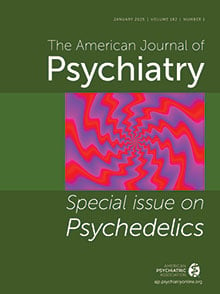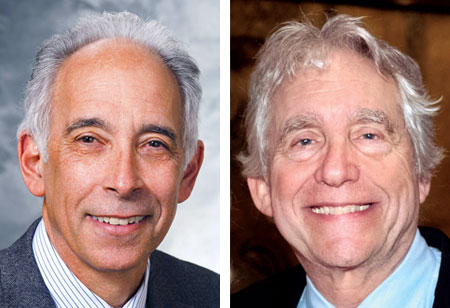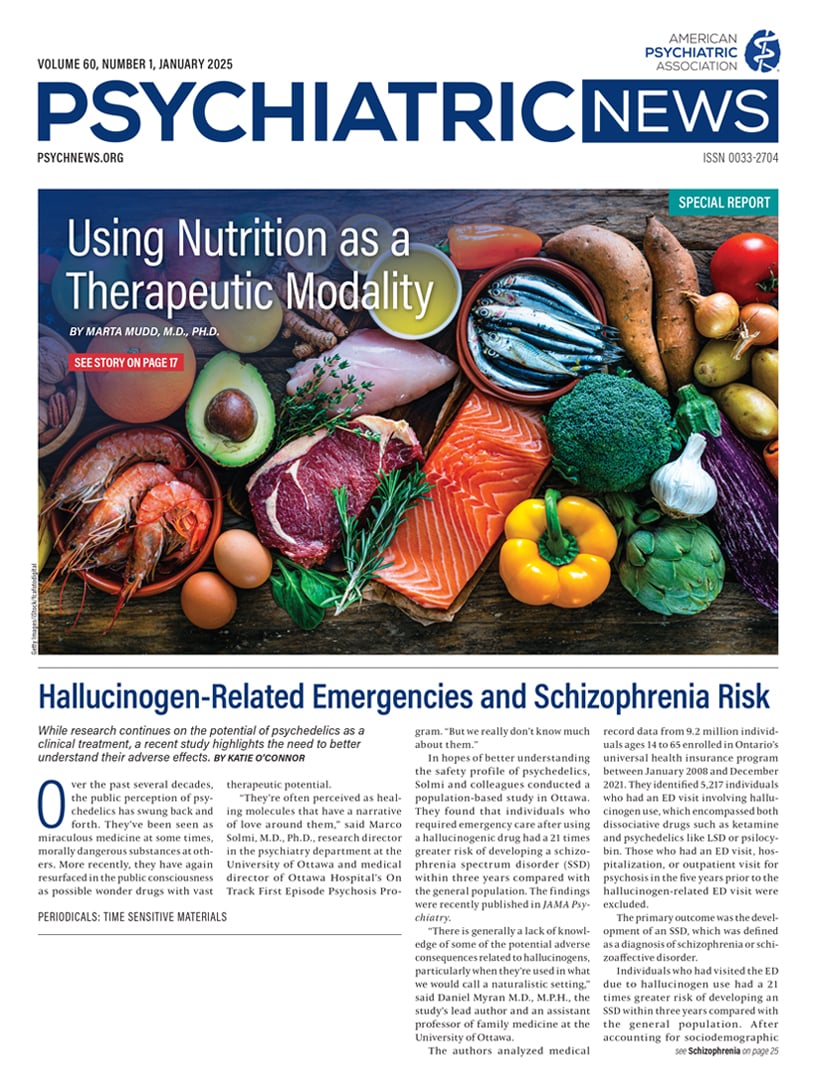This month, The American Journal of Psychiatry is publishing a special issue focused entirely on psychedelic medicine. “This marks a moment of legitimacy for what was once considered a fringe, fledgling movement driven solely by a select group of zealously dedicated scientists and clinicians,” issue editors Gregory A. Fonzo, Ph.D., and Charles B. Nemeroff, M.D., Ph.D., and AJP Editor in Chief Ned H. Kalin, M.D., write in an editor’s note.
“In contrast to this early nascent period, the enthusiasm, interest, and pursuit of scientific and medical research on the psychiatric applications of psychedelic compounds has exploded in recent years, leading to the declaration of the current phase as a ‘renaissance’ period for psychedelic research.”
Kalin recently sat down with Nemeroff, an international leader in psychopharmacology and biological psychiatry, co-director of the Center for Psychedelic Research and Therapy, and professor of psychiatry and behavioral sciences at the University of Texas at Austin, to discuss the special issue’s findings on psychedelic drugs and their therapeutic effects on mental health. Their conversation has been edited for length and clarity.
Nemeroff: I’m excited to co-edit this special issue on psychedelics; there is a need for us to bring scientific rigor to a field that is somewhat ahead of its skis. There is so much publicity about psychedelics in the lay media and on the internet.... It’s remarkable, and at the same time, there is also an emerging database about the potential utility of psychedelics as medication to treat psychiatric disorders. It is the right time to launch this issue and give the readers of the journal today’s “state-of-the-art view” of psychedelic medicine.
Kalin: There’s been a surge of recent interest in the more rapid- and shorter-acting psychedelic drugs, which are being explored as potential new medications. Let’s talk about the review paper by Ramaekers and colleagues, which details some of the potential treatments on the horizon.
Nemeroff: It’s an intriguing manuscript, largely focusing on what’s called 5-MeO-DMT (also known as O-methylbufotenin or mebufotenin) and its relative DMT (also known as N,N-dimethyltryptamine), both of which are extremely short-acting psychedelics, with a typical length of action from 30 to 60 minutes or as long as 90 minutes, depending on the dose. There’s relatively little data on these, and the question is whether they have the same kind of therapeutic benefit as the longer-acting drugs, such as psilocybin. There’s also controversy about whether a patient needs to have a so-called “psychedelic experience” for these drugs to produce their therapeutic effect.
Kalin: The next paper by Ghaznavi and colleagues explores the potential harms and adverse effects of psychedelic treatments, which range from common and mild to rare but serious psychiatric decompensation and life-threatening cardiac events.
Nemeroff: It is a well-written and thoughtful piece about the need for caution in psychedelic medicine.... There have been case reports of individuals who have ingested psychedelics outside of a clinical setting and have had concerning adverse events, including lengthy psychotic or manic episodes, or what we used to call “bad trips.” We know very little about the individual characteristics that put people at increased risk for these adverse events.
The article also raises issues related to potential abuse liability of these agents. Psychedelic medications don’t have dependence liability like opiates or benzodiazepines, but at the same time, no one would ever suggest that psychedelic doses … should be taken on a regular basis. Caution is warranted.
Kalin: Let’s discuss the next two papers—a review by Fonzo and colleagues on psilocybin and a review by Wolfgang and colleagues on MDMA [3,4-Methylenedioxymethamphetamine], both of which are leading candidates in psychedelic medicine and are closest to clinical utility in psychiatry.
Nemeroff: Undoubtedly, psilocybin has been studied in more randomized controlled trials than any other psychedelic agent. There have been multiple psilocybin trials for depression, and it has been shown to have a superior antidepressant effect over placebo. Its use has also been explored in other illnesses, including alcohol use disorder, for which psilocybin demonstrated a large effect on reducing the number of heavy drinking days, and for patients with metastatic cancer, who experienced long-lasting reduction in their depression and anxiety. There certainly will be more to come in this area, and the results are absolutely promising.
MDMA is an empathogen-enactogenic drug with stimulant and minor psychedelic properties, a different class than “classic” psychedelics like LSD [lysergic acid diethylamide] or psilocybin. It has largely been studied for posttraumatic stress disorder [PTSD], for which its magnitude of therapeutic efficacy is one of the largest of any psychedelic trial....
However, the FDA recently did not approve a submission for MDMA for the treatment of PTSD. Certainly, the efficacy in the trials looks solid, but the FDA is requiring more information.
Kalin: Let’s talk about the role of psychotherapies that are used in tandem with psychedelic treatments.
Nemeroff: There’s a lot of controversy around this, and the field is somewhat divided. The question is, what is the special sauce here that results in clinical efficacy? Is it the drug, or the therapy, or is it the combination? I’ve argued in previous AJP papers that the special sauce is the drug and that psychotherapy may be a helpful addition. I don’t like the term “psychedelic-assisted therapy,” because it implies that the drug is merely assisting the efficacy of psychotherapy.
A study recently done with LSD—without any psychotherapy—showed a robust efficacy in patients with generalized anxiety disorder.... The important thing to know is that the therapy provided in psychedelic trials is geared more toward social support and psychoeducation integration, and not traditional, evidence-based psychotherapy, such as cognitive behavioral therapy.
Kalin: The paper by Aaronson and colleagues delves into more detail about treating patients with severely treatment-resistant depression with psilocybin.
Nemeroff: That paper discusses a trial involving 12 patients with severe treatment-resistant depression.... The participants had three sessions with a therapist using standard psychoeducation integration, followed by a single dose of 25 mg of psilocybin. They experienced dramatic reductions in their MADRS [Montgomery-Åsberg Depression Rating Scale] scores. It was a remarkable result.
What we’re most interested in is the durability of this effect: How long will it last? What we’ve seen with ketamine and esketamine is that their effects may not persist, so this is an important concern.... Also, it was an open study, so you need to take the results with a grain of salt.
Kalin: The next paper, by Pagni and colleagues, also has potential clinical relevance: It is a secondary analysis of a trial examining the effects of a combined psilocybin and psychotherapy treatment for alcohol use disorder, which found that psilocybin promoted long-term improvement in key personality characteristics.
Nemeroff: This was a large clinical trial involving 84 patients that were randomized to receive either psilocybin or diphenhydramine. Participants also received 12 weekly psychotherapy sessions, and there was a long-term follow-up of 24 weeks. Researchers found that participants who took psilocybin experienced long-lasting changes toward normalization of personality traits, as measured on the NEO Personality Inventory, as well as [remission of] their alcohol use disorder. It’s a remarkable finding.
Kalin: A paper developed by COMPASS Pathways focuses on that organization’s clinical trials involving synthetic psilocybin (COMP360) and their psychological support model.
Nemeroff: The COMPASS Group explores the manualized psychotherapy they provide to participants to identify which components are associated with the overall therapeutic response. It’s just one more step toward trying to understand the best type of psychotherapy to provide in conjunction with psychedelic treatment, particularly in the integrative phase.
Kalin: Finally, Olson’s paper addresses the gap in biomarkers to allow us to measure psychedelic-induced increases in human neuroplasticity using a novel, non-invasive imaging approach.
Nemeroff: Human imaging studies, as well as preclinical models, are being used to determine the mechanism of action of psychedelics. Now, there’s burgeoning evidence that psychedelics increase human neuroplasticity, and this may well be their primary mechanism of action. But a lot more work will need to be done.
The last thing I would say is we need more research to investigate whether psychedelics could be useful—either in non-hallucinogenic microdoses that could be taken every day or, alternately, in analogs without any hallucinogenic properties. ■


